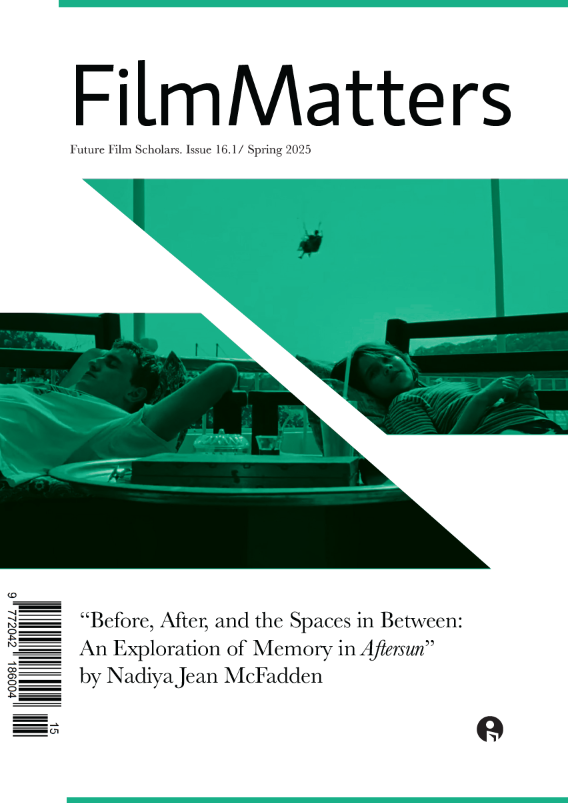
Film Matters: Please tell us about your article that is being published in Film Matters.
Isabella Trevisan: My article is about Julia Ducournau’s body of work and how she discusses womanhood, depicts the female body, and approaches issues of gender and sexuality through the lens of body horror.
FM: What research and/or methodologies do you incorporate in your article?
IT: The methodologies I incorporate are primarily from feminist film scholars who have either directly or indirectly discussed Julia Ducournau or feminism in art horror/body horror.
FM: Describe the original context for/when writing this article while an undergraduate student.
IT: I wrote this article for my Art Film Director class at Wilfrid Laurier University as my final research project.
FM: What does your writing process look like?
IT: My process consists of three steps: 1) initial research and notes, 2) rough draft, and 3) reworking the draft until it’s in a place that I can be proud of. The initial research part is the shortest part of the entire process—even when it’s a niche subject like this article—as the rough draft and reworking happen concurrently and usually take about two to three days.
FM: How have your personal experiences shaped and influenced your writing?
IT: I usually write about topics that I know intimately. Therefore, topics such as gender and sexuality always interest me; I find that different life experiences create different understandings of a film’s meaning, so I try to get my interpretation on paper so others can see different perspectives.
FM: What are your methods for finding diverse and relevant sources?
IT: Luckily for me, niche topics always seem to bring about more diverse opinions and sources. Besides that, I try not to aim for the top of the search—meaning I don’t shy away from combing through search results until I find something that helps me think about a topic in a different, more suitable way.
FM: Why is including marginalized voices in research important to you?
IT: As I stated before, different life experiences create different understandings of a film’s meaning: if I stick only to my opinion or the opinion of the dominant audience, I’m not seeing everything that could be uncovered when watching a film.
FM: What aspects of the writing process were most challenging? Why?
IT: Most likely the timeline for finishing the article. I was juggling four other classes at the time—two of which also required essays—and my schedule was getting a little hectic. But, as you probably know, that’s part of being an undergraduate student.
FM: What’s a resistance point you hit in your writing, and how did you move past it?
IT: Writing comes with a lot of frustration for me. I struggle with not feeling adequate, not being able to fix an issue that I found, writing in circles, and so on. The way I move past this is taking a break from the computer; I remove myself from the space completely and allow my mind to reset before taking another look at what’s irritating me. It helps me to avoid spiraling into negativity and procrastination.
FM: What do you enjoy most about your article?
IT: The most important thing for me is that I got to write about something that I love—the horror genre—and incorporate feminist theory, which I studied on-and-off throughout university. It feels like a culmination of the four years of learning I’ve done. I’m very proud of it.
FM: How has the Film Matters editorial and publication process impacted the development/evolution of your article?
IT: Submitting the paper to Film Matters has really helped me look at the article with fresh eyes, especially through the editing process. The feedback that the reader reports gave helped me elevate my article for future readers.
FM: What audience do you hope to reach with your Film Matters article and/or what impact do you hope it has on the field of film studies?
IT: Ideally it would help others think more critically about how the horror genre can be used in ways that don’t only appeal to the predominantly male audience, such as how Ducournau uses it to discuss gender and sexuality. It would be nice if it aids in creating a more serious and scholarly perspective of horror films, which are usually disregarded as “low brow” media. However, I mainly hope that my article helps some other undergrad students with their research.
FM: How has your department and/or institution supported your work in film and media?
IT: The best thing that the English & Film Department at Laurier has given me is the ability to study a wide range of topics. The class options for film studies are amazing; there’s just so many classes that broaden your view of what film is and what it can be.
FM: How has your faculty mentor(s) fostered your advancement as a film scholar?
IT: I think I’ve taken one of Dr. [Glen W.] Norton’s classes every semester. The way he teaches shows that he really is passionate about film and wants to share it with others. Most importantly, it’s clear in his feedback that he really wants his students to improve. He’s a fantastic professor.
FM: What advice do you have for undergraduate film and media scholars?
IT: Never feel shy about approaching a topic, especially if it’s “new ground.” If you can’t find ample research about a specific topic, that just means your voice is needed!
FM: What are your future plans?
IT: Scary question. I’m going to get a master’s degree in screenwriting, as my big dream is to write for television and film. After that, who knows?
Author Biography
Isabella Trevisan is an alumnus of Wilfrid Laurier University, who graduated with an Honours Bachelor of Arts in Film Studies in June 2024. Her research interests lie primarily in the evolution of film genres and political philosophy in film, specifically in the horror genre.







































